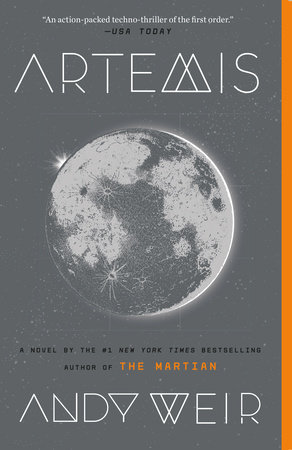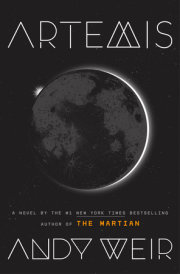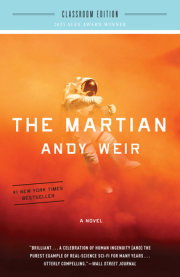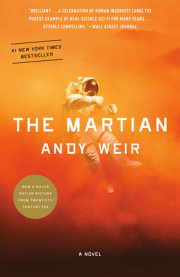Chapter 1
I bounded over the gray, dusty terrain toward the huge dome of Conrad Bubble. Its airlock, ringed with red lights, stood distressingly far away.
It’s hard to run with a hundred kilograms of gear on--even in lunar gravity. But you’d be amazed how fast you can hustle when your life is on the line.
Bob ran beside me. His voice came over the radio: “Let me connect my tanks to your suit!”
“That’ll just get you killed too.”
“The leak’s huge,” he huffed. “I can see the gas escaping your tanks.”
“Thanks for the pep talk.”
“I’m the EVA master here,” Bob said. “Stop right now and let me cross-connect!”
“Negative.” I kept running. “There was a pop right before the leak alarm. Metal fatigue. Got to be the valve assembly. If you cross-connect you’ll puncture your line on a jagged edge.”
“I’m willing to take that risk!”
“I’m not willing to let you,” I said. “Trust me on this, Bob. I know metal.”
I switched to long, even hops. It felt like slow motion, but it was the best way to move with all that weight. My helmet’s heads-up display said the airlock was fifty-two meters away. I glanced at my arm readouts. My oxygen reserve plummeted while I watched. So I stopped watching.
The long strides paid off. I was really hauling ass now. I even left Bob behind, and he’s the most skilled EVA master on the moon. That’s the trick: Add more forward momentum every time you touch the ground. But that also means each hop is a tricky affair. If you screw up, you’ll face-plant and slide along the ground. EVA suits are tough, but it’s best not to grind them against regolith.
“You’re going too fast! If you trip you could crack your faceplate!”
“Better than sucking vacuum,” I said. “I’ve got maybe ten seconds.”
“I’m way behind you,” he said. “Don’t wait for me.”
I only realized how fast I was going when the triangular plates of Conrad filled my view. They were growing very quickly.
“Shit!” No time to slow down. I made one final leap and added a forward roll. I timed it just right--more out of luck than skill--and hit the wall with my feet. Okay, Bob was right. I’d been going way too fast.
I hit the ground, scrambled to my feet, and clawed at the hatch crank.
My ears popped. Alarms blared in my helmet. The tank was on its last legs--it couldn’t counteract the leak anymore.
I pushed the hatch open and fell inside. I gasped for breath and my vision blurred. I kicked the hatch closed, reached up to the emergency tank, and yanked out the pin.
The top of the tank flew off and air flooded into the compartment. It came out so fast, half of it liquefied into fog particles from the cooling that comes with rapid expansion. I fell to the ground, barely conscious.
I panted in my suit and suppressed the urge to puke. That was way the hell more exertion than I’m built for. An oxygen-deprivation headache took root. It’d be with me for a few hours, at least. I’d managed to get altitude sickness on the moon.
The hiss died to a trickle, then finished.
Bob finally made it to the hatch. I saw him peek in through the small round window.
“Status?” he radioed.
“Conscious,” I wheezed.
“Can you stand? Or should I call for an assist?”
Bob couldn’t come in without killing me--I was lying in the airlock with a bad suit. But any of the two thousand people inside the city could open the airlock from the other side and drag me in.
“No need.” I got to my hands and knees, then to my feet. I steadied myself against the control panel and initiated the cleanse. High-pressure air jets blasted me from all angles. Gray lunar dust swirled in the airlock and got pulled into filtered vents along the wall.
After the cleanse, the inner hatch door opened automatically.
I stepped into the antechamber, resealed the inner hatch, and plopped down on a bench.
Bob cycled through the airlock the normal way--no dramatic emergency tank (which now had to be replaced, by the way). Just the normal pumps-and-valves method. After his cleanse cycle, he joined me in the antechamber.
I wordlessly helped Bob out of his helmet and gloves. You should never make someone de-suit themselves. Sure, it’s doable, but it’s a pain in the ass. There’s a tradition to these things. He returned the favor.
“Well, that sucked,” I said as he lifted my helmet off.
“You almost died.” He stepped out of his suit. “You should have listened to my instructions.”
I wriggled out of my suit and looked at the back. I pointed to a jagged piece of metal that was once a valve. “Blown valve. Just like I said. Metal fatigue.”
He peered at the valve and nodded. “Okay. You were right to refuse cross-connection. Well done. But this still shouldn’t have happened. Where the hell did you get that suit?”
“I bought it used.”
“Why would you buy a used suit?”
“Because I couldn’t afford a new one. I barely had enough money for a used one and you assholes won’t let me join the guild until I own a suit.”
“You should have saved up for a new one.” Bob Lewis is a former US Marine with a no-bullshit attitude. More important, he’s the EVA Guild’s head trainer. He answers to the guild master, but Bob and Bob alone determines your suitability to become a member. And if you aren’t a member, you aren’t allowed to do solo EVAs or lead groups of tourists on the surface. That’s how guilds work. Dicks.
“So? How’d I do?”
He snorted. “Are you kidding me? You failed the exam, Jazz. You super-duper failed.”
“Why?!” I demanded. “I did all the required maneuvers, accomplished all the tasks, and finished the obstacle course in under seven minutes. And, when a near-fatal problem occurred, I kept from endangering my partner and got safely back to town.”
He opened a locker and stacked his gloves and helmet inside. “Your suit is your responsibility. It failed. That means you failed.”
“How can you blame me for that leak?! Everything was fine when we headed out!”
“This is a results-oriented profession. The moon’s a mean old bitch. She doesn’t care why your suit fails. She just kills you when it does. You should have inspected your gear better.” He hung the rest of his suit on its custom rack in the locker.
“Come on, Bob!”
“Jazz, you almost died out there. How can I possibly give you a pass?” He closed the locker and started to leave. “You can retake the test in six months.”
I blocked his path. “That’s so ridiculous! Why do I have to put my life on hold because of some arbitrary guild rule?”
“Pay more attention to equipment inspection.” He stepped around me and out of the antechamber. “And pay full price when you get that leak fixed.”
I watched him go, then slumped onto the bench.
“Fuck.”
I plodded through the maze of aluminum corridors to my home. At least it wasn’t a long walk. The whole city is only half a kilometer across.
I live in Artemis, the first (and so far, only) city on the moon. It’s made of five huge spheres called “bubbles.” They’re half underground, so Artemis looks exactly like old sci-fi books said a moon city should look: a bunch of domes. You just can’t see the parts that are belowground.
Armstrong Bubble sits in the middle, surrounded by Aldrin, Conrad, Bean, and Shepard. The bubbles each connect to their neighbors via tunnels. I remember making a model of Artemis as an assignment in elementary school. Pretty simple: just some balls and sticks. It took ten minutes.
It’s pricey to get here and expensive as hell to live here. But a city can’t just be rich tourists and eccentric billionaires. It needs working-class people too. You don’t expect J. Worthalot Richbastard III to clean his own toilet, do you?
I’m one of the little people.
I live in Conrad Down 15, a grungy area fifteen floors underground in Conrad Bubble. If my neighborhood were wine, connoisseurs would describe it as “shitty, with overtones of failure and poor life decisions.”
I walked down the row of closely spaced square doors until I got to my own. Mine was a “lower” bunk, at least. Easier to get into and out of. I waved my Gizmo across the lock and the door clicked open. I crawled in and closed it behind me.
I lay in the bunk and stared at the ceiling--which was less than a meter from my face.
Technically, it’s a “capsule domicile” but everyone calls them coffins. It’s just an enclosed bunk with a door I can lock. There’s only one use for a coffin: sleep. Well, okay, there’s another use (which also involves being horizontal), but you get my point.
I have a bed and a shelf. That’s it. There’s a communal bathroom down the hall and public showers a few blocks away. My coffin isn’t going to be featured in Better Homes and Moonscapes anytime soon, but it’s all I can afford.
I checked my Gizmo for the time. “Craaaap.”
No time to brood. The KSC freighter was landing that afternoon and I’d have work to do.
To be clear: The sun doesn’t define “afternoon” for us. We only get a “noon” every twenty-eight Earth days and we can’t see it anyway. Each bubble has two six-centimeter-thick hulls with a meter of crushed rock between them. You could shoot a howitzer at the city and it still wouldn’t leak. Sunlight definitely can’t get in.
So what do we use for time of day? Kenya Time. It was afternoon in Nairobi, so it was afternoon in Artemis.
I was sweaty and gross from my near-death EVA. There was no time to shower, but I could change, at least. I lay flat, stripped off my EVA coolant-wear, and pulled on my blue jumpsuit. I fastened the belt then sat up, cross-legged, and put my hair in a ponytail. Then I grabbed my Gizmo and headed out.
We don’t have streets in Artemis. We have hallways. It costs a lot of money to make real estate on the moon and they sure as hell aren’t going to waste it on roads. You can have an electric cart or scooter if you want, but the hallways are designed for foot traffic. It’s only one-sixth Earth’s gravity. Walking doesn’t take much energy.
The shittier the neighborhood, the narrower the halls. Conrad Down’s halls are positively claustrophobic. They’re just wide enough for two people to pass each other by turning sideways.
I wound through the corridors toward the center of Down 15. None of the elevators were nearby, so I bounded up the stairs three at a time. Stairwells in the core are just like stairwells on Earth--short little twenty-one-centimeter-high steps. It makes the tourists more comfortable. In areas that don’t get tourists, stairs are each a half meter high. That’s lunar gravity for you. Anyway, I hopped up the tourist stairs until I reached ground level. Walking up fifteen floors of stairwell probably sounds horrible, but it’s not that big a deal here. I wasn’t even winded.
Ground level is where all the tunnels connecting to other bubbles come in. Naturally, all the shops, boutiques, and other tourist traps want to be there to take advantage of the foot traffic. In Conrad, that mostly meant restaurants selling Gunk to tourists who can’t afford real food.
A small crowd funneled into the Aldrin Connector. It’s the only way to get from Conrad to Aldrin (other than going the long way around through Armstrong), so it’s a major thoroughfare. I passed by the huge circular plug door on my way in. If the tunnel breached, the escaping air from Conrad would force that door closed. Everyone in Conrad would be saved. If you were in the tunnel at the time . . . well, it sucks to be you.
“Well, if it isn’t Jazz Bashara!” said a nearby asshole. He acted like we were friends. We weren’t friends.
“Dale,” I said. I kept walking.
He hurried to catch up. “Must be a cargo ship coming in. Nothing else gets your lazy ass in uniform.”
“Hey, remember that time I gave a shit about what you have to say? Oh wait, my mistake. That never happened.”
“I hear you failed the EVA exam today.” He tsked in mock disappointment. “Tough break. I passed on my first try, but we can’t all be me, can we?”
“Fuck off.”
“Yeah, I got to tell you, tourists pay good money to go outside. Hell, I’m headed to the Visitor Center right now to give some tours. I’ll be raking it in.”
“Make sure to hop on the really sharp rocks while you’re out there.”
“Nah,” he said. “People who passed the exam know better than to do that.”
“It was just a lark,” I said nonchalantly. “It’s not like EVA work is a real job.”
“Yeah, you’re right. Someday I hope to be a delivery girl like you.”
“Porter,” I grumbled. “The term is ‘porter.’ ”
He smirked in a very punchable way. Thankfully we’d made it to Aldrin Bubble. I shouldered past him and out of the connector. Aldrin’s plug door stood vigil, just as Conrad’s did. I hurried ahead and took a sharp right just to get out of Dale’s line of sight.
Aldrin is the opposite of Conrad in every respect. Conrad’s full of plumbers, glass blowers, metalworkers, welding shops, repair shops . . . the list goes on. But Aldrin is truly a resort. It has hotels, casinos, whorehouses, theaters, and even an honest-to-God park with real grass. Wealthy tourists from all over Earth come for two-week stays.
I passed through the Arcade. It wasn’t the fastest route to where I was going, but I liked the view.
New York has Fifth Avenue, London has Bond Street, and Artemis has the Arcade. The stores don’t bother to list prices. If you have to ask, you can’t afford it. The Ritz-Carlton Artemis occupies an entire block and extends five floors up and another five down. A single night there costs 12,000 slugs--more than I make in a month as a porter (though I have other sources of income).
Despite the costs of a lunar vacation, demand always exceeds supply. Middle-class Earthers can afford it as a once-in-a-lifetime experience with suitable financing. They stay at crappier hotels in crappier bubbles like Conrad. But wealthy folks make annual trips and stay in nice hotels. And my, oh my, do they shop.
More than anywhere else, Aldrin is where money enters Artemis.
There was nothing in the shopping district I could afford. But someday, I’d have enough to belong there. That was my plan, anyway. I took one more long look, then turned away and headed to the Port of Entry.
Copyright © 2017 by Andy Weir. All rights reserved. No part of this excerpt may be reproduced or reprinted without permission in writing from the publisher.










